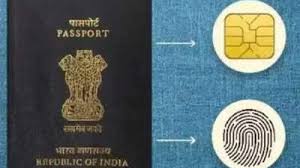E-Passports : India Joined

India has joined over 120 nations in issuing biometric e-passports, offering enhanced security, faster immigration, and global compliance.
- An e-passport (electronic or biometric passport) is an upgraded version of the traditional passport. It combines a conventional booklet with an embedded Radio Frequency Identification (RFID) chip and antenna in the back cover.
- This chip securely stores the holder’s personal and biometric data, including:
- Name, date of birth, passport number, and other demographic details
Biometric facial data and fingerprints
Digital signature for secure authentication
Security Features of E-Passports
RFID Chip & Antenna: Stores encrypted personal and biometric data, making unauthorized access or tampering extremely difficult.
Basic Access Control (BAC): Stops unauthenticated access to the chip by restricting scanning equipment to only authorized devices.
Passive Authentication (PA): Authenticates stored information and identifies tampering.
Extended Access Control (EAC): Introduces an additional layer of security to biometric data such as fingerprints.
Public Key Infrastructure (PKI): Digitally signs the data, ensuring authenticity and preventing forgery or unauthorized data changes.
Benefits of E-Passports
Enhanced Security: Strong protection against forgery, duplication, and identity theft due to encrypted biometric data and digital signatures.
Faster Immigration: Automated e-gates and digital verification reduce manual checks and waiting times at airports.
Global Acceptance: Compliance with International Civil Aviation Organization (ICAO) standards ensures smooth travel and easier visa processing worldwide.
Privacy: New e-passports no longer print the residential address on the last page; it is stored digitally and accessible only to authorised officials.
- Name, date of birth, passport number, and other demographic details




